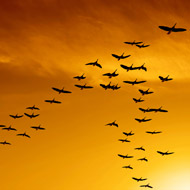Avian flu outbreaks likely due to wild birds

It is believed the avian flu threat posed by wild birds has increased since last November.
Indirect contact with wild birds is believed to be the most likely cause of two recent outbreaks of avian influenza (AI) in the UK. This is according to the results of epidemiological investigations published by the APHA.
Advanced analysis was carried out to determine whether the UK case of H5N8 highly pathogenic AI was linked to other cases in Germany, The Netherlands and Italy.
The results suggest "a high degree of similarity but there are some differences which make direct contact between these cases unlikely".
An outbreak of the H5N8 strain was confirmed on a duck breeding farm in Yorkshire in November 2014. The same strain was also found in turkeys and ducks in Germany, chickens and ducks in The Netherlands and turkeys in Italy.
Earlier this year, H7N7 low pathogenic AI was discovered in broiler breeder chickens in Hampshire. This strain was last detected in the UK in June 2008.
It is thought the case in Hampshire, which resulted in the culling of more than 10,500 birds, was most likely caused by indirect contact with wild birds as a result of poultry house flooding. Water from a neighbouring field is known to be frequented by a large number of wild birds.
While the report states there is "substantial uncertainty" about the origin of the Yorkshire outbreak, it is believed likely that the "most probable" source was also indirect contact with wild birds: "For example through faecal contamination of the environment, which was then transferred into the duck sheds by means of contaminated fomites (e.g. personnel, equipment etc)."
The report's authors believe the threat posed by wild birds has increased since last November. "There remains some uncertainty around the risk posed by wild birds and whether further cases or outbreaks may occur: there is evidence of virus still circulating in Europe and therefore we consider there is an increased risk of another outbreak (risk level is 'low to medium' where 'low' is an event that is rare but could occur and 'medium' is an event which occurs regularly)."
Defra's Science Advisory Council sub-group on exotic diseases met late last year to consider the H5N8 outbreak in Yorkshire. Following a number of recommendations from the group, the APHA says it will review plans for increasing capacity for laboratory testing of samples and the provision and deployment of vets through the Veterinary Delivery Partnership framework.
To read the reports and the full set of recommendations by the Exotic Diseases Sub-Group, visit: https://www.gov.uk/government/publications/reports-relating-to-recent-cases-of-avian-influenza-bird-flu



 The latest
The latest